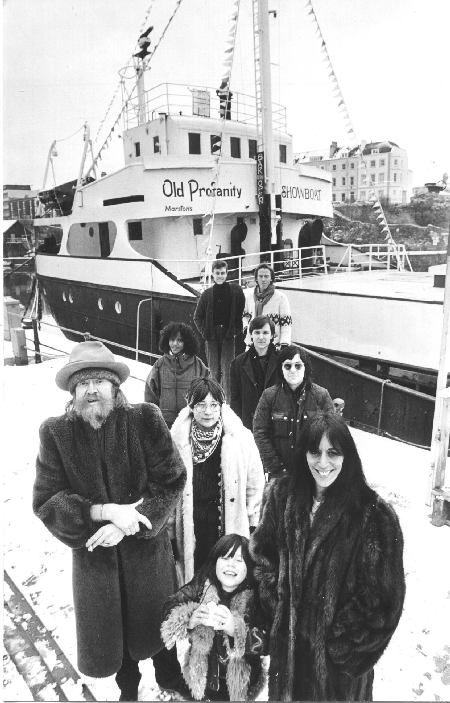

Photograph, courtesy of the Bristol Evening Post
From front to back, from left to right:
1. Vivian Stanshall, Silky Longfellow-Stanshall, and Ki Longfellow-Stanshall
2. Sydney Longfellow and Nick Kearey
3. Hirut Araya Bihon and her then husband Hayden Goodland
4. Phil Trenchard and David Williams
These are people who were part of the Old Profanity, helping to create something from practically nothing except creative energy. They sometimes worked the most menial and filthy jobs to keep the Old Pro Afloat. There were many more, sadly not pictured here. ~ Sydney
|
In short order, I had a ship, the German built
Thekla
, 180 feet from nose to butt (abaft me stern hearties), and thirty feet or so from side to side, with an eight foot draft. Abandoned and unloved for seven years after running aground at Gateshead, her cargo hold was lined in jarrah wood which is hard as a heart and as red as redwood. Her engine room was not huge, but seemed that way because of the U-boat engine her builders had stuck down there. Twice as powerful as the engine she might normally have had, it was left over from the War. I'll repeat that. Left over from the War. And she was one of the last of those old-fashioned ships, meaning well made: not merely welded, but riveted. We found her in the derelict English docks of bravely bleak
Sunderland
which is a bit below an almost bleaker Newcastle which is on the east coast of England somewhere up near Scotland.
So now I had the Thekla.
And then I had the BBC filming the conversion of the ship - ah, like a chrysalis that conversion was, opening not into a butterfly, but into a moth. (A moth flies by night bumping into a lot of hot lights.) I had the
City of Bristol
offering her a mooring in their Floating Harbour: pick a mooring, any mooring. I had a small eclectic 'crew', all but one of whom had never been near a ship before. I had a small lump of a smallish brewer's money... and it was wheyhey, make room, make room in the open sea!
The good ship Thekla (and she was, she was) sailed under her own power for six hundred and thirty two nautical miles: from Sunderland down the east coast of Blighty, passing on the way the huge, flat, hungry mouth of the River Thames, and then for a wee while sailing within sight of the White Cliffs of Dover ('by lightning' they were like Hubert's dazzling dentures), to then scut all along that bottom bit (nice view of the Isle of Wight from the backside, where Vivian once played to people who held up thousands of candles), and thence back out into the sea so as to miss that jutting thing on which sits Cornwall and Penzance, and then up past the Scilly Isles and past Tintagel and past Lundy Island, and so into the long mouth of the Severn, and on to Bristol which is reached by a tidal river and by sailing under that beautiful objet d'art, Isambard Kingdom Brunel 's suspension bridge. And not for a minute was she insured nor was she in any way registered nor was she properly or improperly filled with ballast... ballast? Though, without ballast, she did roll and sway under the Panamanian flag I bought for a couple of quid, and which got all icky dirty when the U-boat engine down in the engine room coughed up a huge wad of black gluck. But then, so did everything else. Trouble was, unlike everything else, the flag wouldn't wash out, so there it flapped from the flag attachment thingy - as gray as, uh, something gray. |
Old Profanity Presents : A Work in Progress
Forward Dear Reader . . .
 Back Again . . .
Back Again . . .

Please don't use photos or text from this site without asking. Many of these images belong to the family personally or are copyright protected.
Site Designed by:















